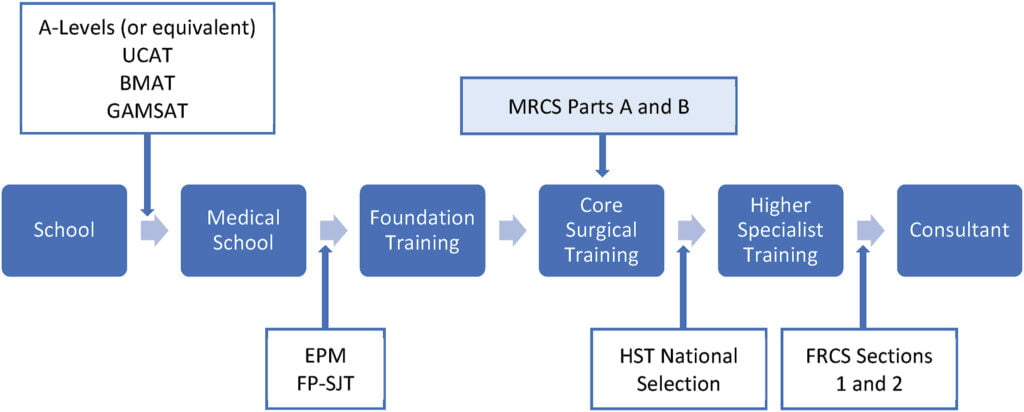It’s a well-known fact that it is harder for IMG doctors not only to pass standardized UK medical exams such as the MRCS, but also to get into Higher Specialty training (HST). This article looks at the actual statistics from published data and offers advise on how to improve your application chances. The studies show that IMGs have lower chances of getting into HST, we will deconstruct this and see how to use this to your advantage.
The 1st study I found to be interesting is titled: Establishing the predictive validity of the intercollegiate membership of the Royal Colleges of surgeons written examination: MRCS Part A (1). The Intercollegiate Committee for Basic Surgical Examinations (ICBSE) is a joint body created by the Royal Colleges of Surgery in the UK and Ireland to ensure the quality of the Royal College exams. The quality metrics are: i. Reliability: reproducibility of a test or, rather, the consistency in test results if you repeat the exam. ii. Validity: the ability of a test to accurately measure what it’s supposed to measure. Predictive validity is the ability to predict future outcomes of those who’ve taken a test. The study’s main aim was to investigate the predictive validity of MRCS Part A for future surgeons.
The authors reviewed data from 4 longitudinal cohort studies by the ICBSE looking at how the MRCS part A correlated with other exams from pre-medical school (A-levels) to becoming a consultant (FRCS). Figure 1 in the study illustrates the standard UK training pathway for surgeons.

Figure 1. UK Surgical training pathway, including assessments taken throughout (1)
The results found a statistically significant correlation between MRCS Part A and all other examination scores. They found that the odds of passing MRCS Part A on the first attempt were up to 20% higher for every additional point in the Educational Performance Measure (EPM). This score is calculated on completion of UK medical school and using the student’s performance in med school plus points for publications and any additional degrees. Interestingly, they also found a positive correlation with the Foundation Program Situational Judgement Test (FP-SJT). This is a behaviours, traits, and attitudes test for selection into the UK Foundation Training Programme. Showing that behaviours and attitudes significantly contribute to success in MRCS and other standardized exams.
Those who pass the MRCS part A on 1st attempt had a higher chance of passing part B and FRCS exam. However, the chances of passing reduced with every re-attempt OR of 0.56 at four or more attempts compared to 1st attempt. A 2017 study similarly found that there was a significant positive correlation between 1st attempt MRCS part B and selection into national training in general and vascular surgery (2). The chances of success are reduced with additional failed attempts at MRCS part B. Those who did the MRCS part B more than twice had about 10% less chances of being accepted to national higher surgical training compared to those who passed on 1st attempt.
The Royal College of Surgeons of England published an article in 2023 on differential attainment in the MRCS. Differential attainment was defined as: “systematic differences in outcome when grouping cohorts by protected characteristics and socioeconomic background”. The findings were: 1. Men (53% pass) are likelier to pass MRCS part A compared to women (39.1%) on 1st attempt. 2. White candidates are more likely to pass both MRCS exams than both Blacks and Asians. 3. Younger candidates, i.e. < 29 years old, perform better than older ones, who are >29yrs.
A 2023 study titled: The certificate of readiness to enter higher surgical training (CREHST) route: Proportion of applicants and likelihood of success has some interesting insights (3). This paper compared the likelihood of successfully getting into higher surgical training (HST) between Core Surgical Trainees (CST) and applications through the CREHST pathway. This was interesting as many IMGs apply for training through the CRESHT route. They conducted a retrospective study of the 2021-22 application cycle. They found that 46% of HST was through the CREHST route. The competition ratio was 4.05, i.e. 485 training posts vs 1,1964 applicants. 80% of training posts were awarded to CST applicants. CREHST applicants got 20% of the posts (98) the highest in vascular surgery at 39% (9 posts).
Why is this important information? IMGs are less likely to pass MRCS exams on 1st attempt, thus requiring multiple attempts. Additionally, IMGs are more likely to apply via CREHST route than CST.
What are some actionable steps to improve your chances of getting into HST?
- If you are eligible for CST as an IMG, starting through this pathway may improve your chances of getting into HST.
- Improve your chances of passing MRCS on the first attempt by proper preparation. I recommend taking preparation courses, which I have discussed in a separate article.
- If you are applying through CREHST route, ensure you have built your portfolio to match CST applicants through: Publications, Audits/ Quality improvement projects, Conference presentations, Leadership roles and PG qualifications (diploma, Masters, or PhD)
- Remember the power of having the right behaviours and attitudes
I was able to get into the HST via the CREHST route, despite having failed MRCS part B on my 1st attempt. If I can do it, you can too. You have at least a 20% chance of success; why not make the best of it?
Reference:
1. Ellis R, Cleland J, Scrimgeour DS, Lee AJ, Hines J, Brennan PA. Establishing the predictive validity of the intercollegiate membership of the Royal Colleges of surgeons written examination: MRCS Part A. Surgeon. 2023;21(6):323-30.
2. Scrimgeour D, Cleland J, Lee A, Griffiths G, McKinley A, Marx C, et al. Impact of performance in a mandatory postgraduate surgical examination on selection into specialty training. BJS open. 2017;1(3):67-74.
3. Baldwin AJ. The certificate of readiness to enter higher surgical training (CREHST) route: Proportion of applicants and likelihood of success. Surgeon. 2023;21(6):331-6.
